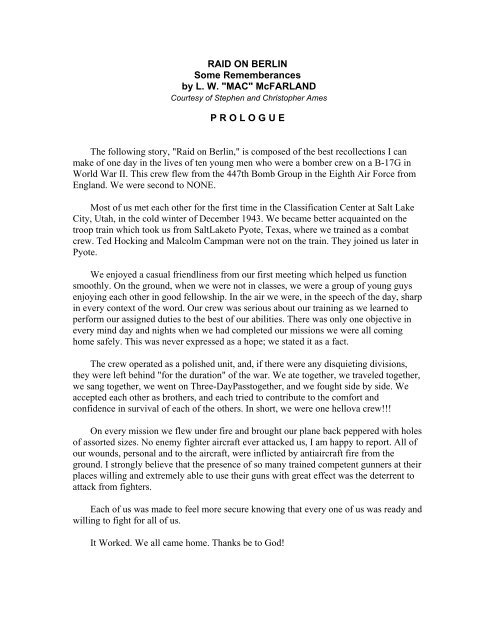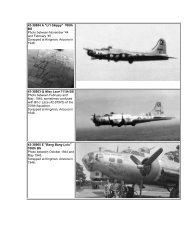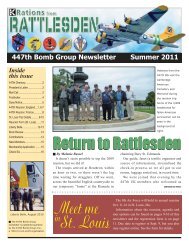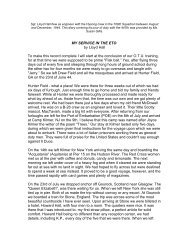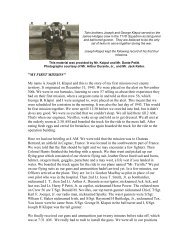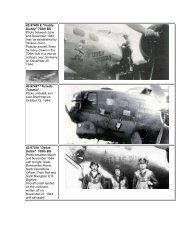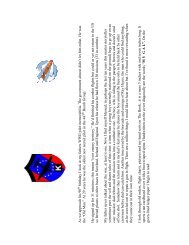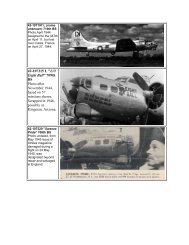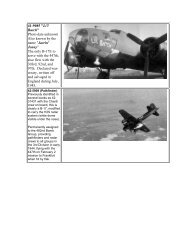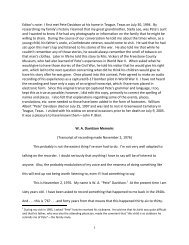Create successful ePaper yourself
Turn your PDF publications into a flip-book with our unique Google optimized e-Paper software.
<strong>RAID</strong> <strong>ON</strong> <strong>BERLIN</strong><br />
Some Rememberances<br />
by L. W. "MAC" McFARLAND<br />
Courtesy of Stephen and Christopher Ames<br />
P R O L O G U E<br />
The following story, "Raid on Berlin," is composed of the best recollections I can<br />
make of one day in the lives of ten young men who were a bomber crew on a B-17G in<br />
World War II. This crew flew from the <strong>447th</strong> <strong>Bomb</strong> <strong>Group</strong> in the Eighth Air Force from<br />
England. We were second to N<strong>ON</strong>E.<br />
Most of us met each other for the first time in the Classification Center at Salt Lake<br />
City, Utah, in the cold winter of December 1943. We became better acquainted on the<br />
troop train which took us from SaltLaketo Pyote, Texas, where we trained as a combat<br />
crew. Ted Hocking and Malcolm Campman were not on the train. They joined us later in<br />
Pyote.<br />
We enjoyed a casual friendliness from our first meeting which helped us function<br />
smoothly. On the ground, when we were not in classes, we were a group of young guys<br />
enjoying each other in good fellowship. In the air we were, in the speech of the day, sharp<br />
in every context of the word. Our crew was serious about our training as we learned to<br />
perform our assigned duties to the best of our abilities. There was only one objective in<br />
every mind day and nights when we had completed our missions we were all coming<br />
home safely. This was never expressed as a hope; we stated it as a fact.<br />
The crew operated as a polished unit, and, if there were any disquieting divisions,<br />
they were left behind "for the duration" of the war. We ate together, we traveled together,<br />
we sang together, we went on Three-DayPasstogether, and we fought side by side. We<br />
accepted each other as brothers, and each tried to contribute to the comfort and<br />
confidence in survival of each of the others. In short, we were one hellova crew!!!<br />
On every mission we flew under fire and brought our plane back peppered with holes<br />
of assorted sizes. No enemy fighter aircraft ever attacked us, I am happy to report. All of<br />
our wounds, personal and to the aircraft, were inflicted by antiaircraft fire from the<br />
ground. I strongly believe that the presence of so many trained competent gunners at their<br />
places willing and extremely able to use their guns with great effect was the deterrent to<br />
attack from fighters.<br />
Each of us was made to feel more secure knowing that every one of us was ready and<br />
willing to fight for all of us.<br />
It Worked. We all came home. Thanks be to God!
D E D I C A T I O N<br />
This story is gratefully dedicated to the men who flew that mission. They are the<br />
inspirations for writing the recollections.<br />
To each of you, for making it possible for me to come home to a good life, thank you!!<br />
Your crewmate,<br />
Pilot Herbert S. "Skipper"<br />
Altman, New York<br />
Co-Pilot L. W. "Mac"<br />
McFarland, Florida<br />
Navigator Frank T. "Ted"<br />
Hocking, Illinois<br />
<strong>Bomb</strong>ardier Jay W. Ames,<br />
Pennsylvania<br />
Right Waist Charles H. "Chuck"<br />
Aldridge, Kansas<br />
Left Waist Malcolm C. "Mack"<br />
Campman, New York<br />
Ball Turret John "J-J" Dow, Ohio<br />
Radio William M. "Arkey"<br />
Simington, Arkansas<br />
Top Turret Rex L. Jones,<br />
California<br />
Tail Turret Marvin H. "Marv"<br />
Handley, Tennessee<br />
Additionally, on one mission, we<br />
were joined by:<br />
<strong>Bomb</strong>ardier James Walker<br />
Davidson "Jimmy" Ohio<br />
Tail Turret Fritz Jost "Fritz"<br />
South Dakota<br />
At midnight the Charge of Quarters turned on the lights in our hut. Seven pairs of<br />
tired eyes looked up at him. He began to read, "Lt. Vorhees' and Lt. Altman's crews -<br />
briefing will be in forty-five minutes." We had had but four hours sleep, and we put on<br />
our clothes while more asleep than awake.<br />
"How much gas today, C. Q.?"<br />
"Well, sir, the Tokyos are topped off."
A long sigh arose from the whole barracks, then one voice made of seven said, "Big<br />
B, sure as hell!!"<br />
On our way to breakfast the half-haze, half-fog morning mist practically concealed<br />
the men just ahead of us. The mess hall looked cheerful and warm after the cold of the<br />
early English morning. Faces equally as tired as my own looked up from the tables. Only<br />
here fresh eggs were served, nowhere else in England could one obtain them. This was a<br />
special treat for us before our missions.<br />
We gulped down our breakfast and coffee, and then we rushed to the trucks waiting<br />
outside to take us to the briefing room. Little red glowing coals all around told us we<br />
were not alone. The cigarettes were the only lights in the trucks. The bumps on the way<br />
to the briefing room woke even the sleepiest of us.<br />
Benches were lined in two rows on either side of a huge Nissen hut that was the<br />
briefing room. There was an aisle between the two rows for the projection machine. A<br />
screen was hanging before the map. Concealed behind the screen was our target for the<br />
day.<br />
We were all seated when the <strong>Group</strong> Commanding Officer came in. Someone yelled,<br />
"Attention!" and we stood until he reached the front of the room.<br />
"Please be seated. Let's get this target today, and we won't have to go back." He took<br />
his chair, and the briefing got under way.<br />
Altogether too slowly the screen was raised, and the map was exposed. Colored<br />
pieces of yarn charted our courses in and out of Germany. The red yarn showed our<br />
course in; it went up over Holland and then to Berlin--the "Big B". The blue yarn<br />
indicated our course out through northern France. There were pieces of transparent<br />
plastic outlined in red covering sections of the map. They represented Flak gun positions.<br />
The large areas were for many Flak guns, the smaller ones for fewer guns. There was a<br />
noticeably large piece over Berlin. It indicated a concentration of anti-aircraft guns in and<br />
around that city.<br />
The screen was lowered after the Navigation Officer briefed us on the courses. We<br />
were warned not to leave the course being flown except in emergencies.<br />
Next, the Weather Officer took over; his was the most complete data in any theatre<br />
of operations. The weather reports were called in by aircraft sent over Germanyduring the<br />
night. "Low clouds at 5000 feet - topped at 7000. Another layer at 10,000 feet - tops<br />
unreported. Contrails will form at 15,000, if you're in the clear. The high clouds at 30,000<br />
feet probably won't bother you. Temperature at flight altitude will be 35° below zero."<br />
The navigators were given wind velocities at all altitudes by the Navigation Officer,<br />
and then he synchronized our watches. "Coming up on 0147 in 30 seconds - 20 seconds -<br />
10 seconds - 5 - 4 - 3 - 2 - 1, hack!" Now all our watches told the same time.
From here on, Intelligence took over. Detailed maps and charts of the target areas<br />
were projected on the screen for us. Photographs, perhaps only twelve hours old, were<br />
also shown and discussed. The main point of bomb impact, called the M.P.I., was marked<br />
with a big red cross in the center of Berlin. Our courses in and out of the target were also<br />
shown in red.<br />
The Intelligence Officer briefed us, "There are at least five hundred heavy guns and a<br />
number of mediums in Berlin. We've routed you so you won't be under fire longer than<br />
necessary. Mostly, you'll meet barrage Flak. There may be fighters there too. There are<br />
three airdromes outside Berlinand a number in nearby towns. Tell your gunners to be<br />
alert. The FW-190 and JU-88 are the ones most likely to be encountered. Some of the<br />
88's may be carrying rockets. Four groups of P-47's will pick you up at Enemy Coast-in<br />
point. They'll carry you for an hour and three groups of P-38's will take you from there to<br />
twenty miles this side of the target. There you will be picked up by three groups of P-<br />
51's. Coming out you'll get area support by two more groups of P-51's and three of P-<br />
38's."<br />
"You'll be over water for some time. Keep your eyes open for ship movements. If<br />
there are convoys on the Autobahns, let us know that too. Keep your eyes open,<br />
especially for traffic on the Dutch Canals. See you when you get back - Good Luck!"<br />
Everyone filed out to his locker, and the <strong>Bomb</strong>ardiers got their final briefing on the<br />
target. The bomb load was discussed and dropping interval selected for maximum effect.<br />
Amesjoined us at the lockers when his briefing was finished.<br />
The usual horseplay was in progress in the locker room. While someone playfully<br />
helped you undress, you tried to dress. First, I donned my Physical Training clothes from<br />
cadet days then, my flying suit. Next came my leather jacket and fur lined boots. The<br />
Mae West life preserver and the chute harness went on last. We carried out our chute<br />
packs, leather helmets, gloves, oxygen masks and Flak helmets.<br />
One of the co-pilot's jobs was to get our rations for the flight. As I walked over to<br />
pick up our share of chocolate bars and gum, Amesyelled, "Don't forget the R.A.F.<br />
rations, Mac, the boys like them."<br />
"Roger!"<br />
After that, I checked in my wallet and papers with the Intelligence Office. Each man<br />
had an individual bag and a receipt. "I'll be back later for that" was the usual comment.<br />
And, "we'll be expecting you" was the reply. The smile that followed helped convince<br />
even the most doubtful.<br />
For those who desired it, the Chaplains said mass and gave Holy Communion. Many<br />
attended a little service before take off time.
The trucks were waiting for us outside, and the drivers were yelling "Low numbers<br />
here!" or, "High here". Ours was a high number, so we piled our equipment on the "High<br />
here" truck. On the way out to our planes a quiet voice said, "What a hellova way to<br />
make a living!" We could feel, rather than see, the smiles all around us.<br />
Briggs, the Co-pilot of the crew in a hut near ours, was being ribbed. His pilot was<br />
having a grand time until Briggs said, "Fellows, I wouldn't want it to be generally known,<br />
but I have a landing to my credit!" Laughery was quiet now. Pilots let Co-Pilots land only<br />
rarely - when they are unable to do so themselves.<br />
"Here is fifty-four" yelled the driver. "Let's go, Mac."<br />
Altman and I jumped off, and the rest of our crew hit the pavement with us. There<br />
stood the love of our lives, a B-17G called "The Bouncin' Baby". She was all metal and<br />
cold as ice, but we loved her. She has taken us out and has brought us back home before.<br />
She had personality. Her name came from the habit of bouncing back home from the<br />
continent and because she was a stubborn little gal to land. She was our baby.<br />
Clark , the crew chief and two of his equally tired assistants were giving Baby her<br />
final checks.<br />
"How is she today, Clark?"<br />
"She's in fine shape, sir."<br />
Nothing more was asked. That "fine shape" stood for long hours of work by<br />
flashlight in the blackout. It assured us we could depend on our plane. Combat crew<br />
chiefs loved their planes and sweated out every mission as much as we who flew them.<br />
There was still some time before we started the engines, so we talked over the<br />
mission with the gunners. All of their guns had been checked and long belts of<br />
ammunition were ready for instant use.<br />
"It's pretty foggy - you'd better flash the lamp for us this morning, Marvin."<br />
With a brief "Okay", Marvin crawled back to his tail gunner position and readied the<br />
lamp for use. His job was to flash a red light so that other ships behind us wouldn't taxi<br />
into our tail in the fog.<br />
Everyone was now aboard, so Altman and I took our seats in the front office. We<br />
went through our check lists, then:<br />
"Start One!"<br />
The centrifugal starter began to whine. When it reached its highest pitch Altman<br />
ordered, "Mesh!" It started.
The other three engines were started in order. As they spewed smoke and fire and<br />
sputtered to life they shook our plane. We felt we were really on our way to Jerryland.<br />
The engines had started easily and checked perfectly, as Clark said they would. Our<br />
engines were warmed up, and we were ready to taxi. The squadron leader passed our<br />
hardstand, and we fell in line. We went around the perimeter track to the takeoff runway.<br />
All along the track other planes were getting ready to taxi out.<br />
Final checks were made just before take-off. Altman and I checked the magnetos,<br />
then –<br />
"Co-pilot to right waist - checking flaps."<br />
"Flaps coming down - all the way down - coming up - they're okay", Chuck, the<br />
engineer reported.<br />
"Report on the crew, Chuck."<br />
"Everyone in the radio room, sir."<br />
"Roger."<br />
We were now set for take-off, so we taxied out to the run- way. Engines roared as<br />
they were run up, and the brakes were held. "Better give me some flaps, Mac. She's<br />
loaded today." The flaps went down half-way.<br />
Thirty seconds after the leader was airborne, our brakes were released, and the Baby<br />
leaped eagerly for the take-off run. For what seems ages in a bomber pilot's life, the<br />
loaded plane rushed down the runway. At last we were airborne too.<br />
"Wheels up!"<br />
The fog was still thick, so the navigator guided us on instruments for the squadron<br />
assembly.<br />
"Pilot to Navigator."<br />
"Go ahead, Herb."<br />
"What's the first course, Ted?"<br />
"Fly 230 for two minutes."<br />
"Roger."<br />
First one then another course was flown, and, at last, at 7,000 feet, we broke through<br />
the top layer of clouds. The sun was peeping over the horizon; day was beginning. All
over the sky were other bombers getting ready for the same job. Flares were being fired<br />
from lead ships of the formations. The radio buzzed with activity.<br />
"Gunblue One, this is Lowland K-king. Will you fire a flare? Over."<br />
"Roger, K-king. Gunblue One circling left, firing flares. Do you see me now?"<br />
"Roger, Gunblue One. K-king joining right away. K-king out."<br />
As we circled for what seemed to be hours, other planes gained altitude and joined<br />
their formations. Turn about was taken on the controls while the last cigarette was<br />
smoked before the oxygen masks were put on. We continued to climb. Finally, "Co-pilot<br />
to crew, we're at 12,000 feet. Put on your masks, acknowledge."<br />
Familiar voices with a different tone due to speaking into the masks checked in:<br />
"Tail, Roger!"<br />
"Waist gunners, Roger!"<br />
"Ball turret, Roger!"<br />
"Radio, Roger!"<br />
"Top turret, Roger!"<br />
"Navigator, Roger!"<br />
"<strong>Bomb</strong>ardier, Roger!"<br />
"Co-pilot to tail, are you all set back there, Marvin?"<br />
"Roger.Say, Number Six is trailing."<br />
"Okay. Keep an eye on him in case of trouble. How are you Dow? Is it cool in the<br />
ball today, J.J.?"<br />
"It's cool alright. I have my suit turned on already."<br />
"Keep an eye on Arkey in the radio room, Chuck. And you and Campman check<br />
each other's masks there in the waist."<br />
"Roger! Will do."<br />
The Co-pilot usually joined the pilot in monitoring radio for most of the mission,
so –<br />
"Co-pilot to <strong>Bomb</strong>ardier, they're all yours, Ames. Keep an eye on Ted and don't<br />
forget the checks."<br />
"Okay, Mac."<br />
I took over the controls and gave Altman the high sign that everything was set. He<br />
had been on radio and missed the intercom chatter.<br />
The altimeter rose steadily as we climbed on course from England. The Navigator<br />
informed us, "Coast-out point in ten minutes." The combat wings had been formed during<br />
this time, and there were formations on all sides of us. All the planes were now pointed in<br />
one direction - The Big B.<br />
"Navigator to crew, we're leaving England. We'll hit the enemy coast in 30 minutes."<br />
"Ted, let us know five minutes before we hit the enemy coast. We've got to put on<br />
these Flak Suits."<br />
"Roger, can do, Herb."<br />
The formations droned over the channel. First, we flew north and then, East. We<br />
were to enter Germanyfrom Holland. "Light Flak at coast-in point" the Intelligence<br />
Officer had told us.<br />
"Five minutes to coast-in, better put on the suits." Turns were taken on the controls<br />
as Altman and I put our suits and helmets on. The helmet and masks covered all but our<br />
eyes, and we smiled at each other through the masks. Amesreported that the crew was<br />
ready, and all had their suits on.<br />
As the coast came into view our P-47 escort joined us. Boy! Did those buzz boys<br />
look good to us! Flak was reported low on the right side of the ship. Intelligence wasn't<br />
wrong. It was far below us and didn't cause any excitement.<br />
The Dutch border was passed, and Der Vaterland was beneath us now. The first<br />
escort left and the P-38's picked us up. Soon, they too were replaced, and the P-51's were<br />
taking us in to the target.<br />
Suddenly, the sky over the target now directly ahead of us was pockmarked with<br />
polka dots of black smoke. Jerry was awake! Brother, was he awake! This was it!<br />
We were on the bomb run before we knew it. The bomb bay doors opened; the<br />
throttles were advanced. The <strong>Bomb</strong>ardier kept up a steady - - "Flak - -9 o'clock low."
"Flak - -10 o'clock high."<br />
"Flak - -3 o'clock level." "Flak - -10 o'clock level."<br />
"Damn! They're throwing it up today!"<br />
The sweetest words in the English language finally came over the interphone,<br />
"<strong>Bomb</strong>s Away!" The bomb bay doors were quickly closed, and prayers were quietly said<br />
to help us to leave the Flak area safely. Bursts covered the sky in all directions. Our right<br />
wing was raised and lowered by a too- near explosion.<br />
"Flak - -11 o'clock low."<br />
"Flak - -9 o'clock level."<br />
"Flak - -12 o'clock low."<br />
"They're tracking us!"<br />
"Flak - -12 o'clock higher!"<br />
"Flak - -12 o'clock higher!"<br />
"Better pull her up, Herb."<br />
"Flak…"<br />
There was a terrible explosion, and the Baby raised her nose above the horizon. I<br />
could smell the smoke from the Flak shell, even through my mask. Looking down in the<br />
nose I saw Ames in Ted's arms - he wasn't moving! Ted tenderly laid him on the floor<br />
and got his oxygen connected again.<br />
First Aid kits were called for and passed forward, then the interphone was silent.<br />
Altman and I looked at each other in a strange way. One of us had been hit! There are<br />
times when one forgets all about himself - I looked down helplessly while Ted doctored a<br />
dirty cut in Ames leg. "Oh God! why doesn't he move?" I felt tears running down my<br />
cheeks. I didn't try to hold them back. Ted pressed the morphine tube against Amesleg<br />
and injected it, as we had been trained.<br />
All at once he moved! Yes! It was true! He was Alive! "Thanks, God, thanks." Now<br />
the tears were for .joy, he was still alive! The leg was bandaged, and he asked for his<br />
mike to be connected. There was a wonderful voice that said, "Well, I have a medal you<br />
guys haven't, I've got the Purple Heart." Good old Ames, he relieved the tension.<br />
All the crew wanted to know how he was. "He's okay" said the Navigator, "Let him<br />
rest, I just shot him full of dope. He has a wound in his leg, the Flak was stopped on his
stomach by the Flak suit, and it knocked him out. Let him sleep, the dope is beginning to<br />
act."<br />
An uncommonly long time had elapsed in a few minutes. We were out of the Flak<br />
area and homeward bound! It was great to be alive! The wind coming in through the hole<br />
in the nose plexiglas was not so irritating after all.<br />
Coming home, Flak was reported over many German cities - just to let us know. We<br />
didn't care today for we had dropped our bombs on target. Soon the Navigator reported,<br />
"We'll leave the coast in twenty minutes."<br />
"Roger. Say, Ted, get me a course home - we're going in early."<br />
"Okay, Herb."<br />
The channel was under us again. Permission was asked to leave the formation, and it<br />
was granted. As we left the group, the throttles were pushed forward to get Ames to the<br />
Flight Surgeon sooner.<br />
The Navigator's course was true, and soon the field was below us. As we landed,<br />
Jones, the top turret gunner, fired red flares to tell the tower we had a wounded man<br />
aboard. The ambulance could be seen going to the end of the runway to pick him up.<br />
We cut our engines near the ambulance, and the Flight Surgeon came aboard. He<br />
congratulated Ted on his good First Aid work as he examined the wounded leg. As a<br />
stretcher was taking him away, Ames asked for his flak. A queer sort of souvenir, but we<br />
understood. We promised to bring it to the hospital "unless you get back before<br />
tomorrow."<br />
The engines were started again, and we taxied to our hardstand where we were met<br />
by the ground crew. The other planes flew over the field before landing. Eyes strained to<br />
count them – - "They're all back!"<br />
A truck carried us to the briefing room for interrogation. The Intelligence Officer<br />
asked us many questions in order to get a complete report. The number of fighters,<br />
methods of attack, amount of flak, accurate or inaccurate, all of these interested him. One<br />
crew reported some barges on the Dutch Canals. That "Hot News" was wired to<br />
Headquarters for immediate action.<br />
We ate cakes and drank hot coffee served by the Red Cross. On the other side of the<br />
room Scotch was available. Our crew didn't drink today - we had our reasons.<br />
The mess hall people were expecting us. It was dark but they had kept our food<br />
warm for two extra hours. Their smiles told us they were glad to see us back. The same<br />
stew and potatoes were better than ever before.
Going back to the hut, we discussed the day's mission. We were all glad to be back<br />
alive, but we were sorry Ameshad been hit. The beds really looked inviting. As fast as we<br />
could, we crawled in, and we fell asleep - - that sleep known only to those weary of a<br />
trying, dangerous day.<br />
A small prayer of thanksgiving for letting us all return alive was said in a whisper -<br />
then everything was quiet.<br />
On 11 July 1944, the Altman crew took off in 42-102651, Piccadilly Ann II for a<br />
raid on Munich. Hit by flak, unable to keep up with formation, and unable to<br />
return to England, Altman made a forced landing at Dubendorf, Switzerland. The<br />
crew and aircraft were interned.<br />
Jay Ames and Marv Handley had been replaced for that particular mission by Lt.<br />
James Davidson and Sgt. Clarence Jost.


